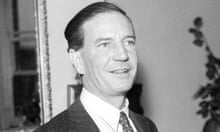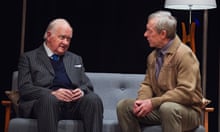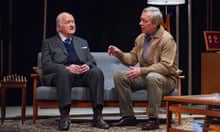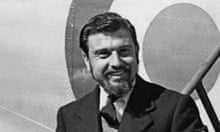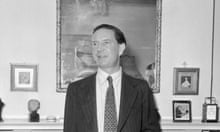Fears that the double agent Kim Philby was being exploited by the KGB prompted a government campaign to minimise political embarrassment and prevent his memoirs being published, according to secret files released to the National Archives.
Details of pressure put on journalists, behind the scenes lobbying and attempts to deflect blame on to the French appear in 1960s Cabinet Office files.
The news that Philby, a former MI6 officer, had been spying for the Russians since 1933 sounded an alarm in Whitehall. Shortly after the extent of Philby’s penetration was publicised in October 1967, the home secretary, Roy Jenkins, wrote to the prime minister, Harold Wilson, warning it could lead to the exposure of another mole, Sir Anthony Blunt.
Blunt had been recruited by the Russians in 1936 when at Cambridge University. He confessed in 1964, at which time he was surveyor of the Queen’s pictures, but his betrayals were not made public until 1979.
Jenkins told Wilson that “critical comments” about Blunt might emerge in the Sunday Times. Blunt, he added, was “at present in Italy … and is likely to remain there until Christmas”.
Sir Denis Greenhill, then the deputy permanent undersecretary at the Foreign Office, coordinated the government response. In late October 1967, Harold Evans, the Sunday Times editor, informed him he had received a telegram from Philby in Moscow offering an interview. Up until then communication had been via Philby’s son.
The files, from a store of miscellaneous documents held by the permanent secretary of the Cabinet Office, have been belatedly handed to the National Archives.
The Philby telegram reads: “Prepared for early serious discussion … October 31st desirable date. Arrange Accommodation through Intourist. Eye (sic) will establish contact here. Grateful early reply. Postbox 509 Main Post Office Moscow Philby.”
A meeting chaired by Sir Burke Trend, the cabinet secretary, decided to warn Evans he could breach the Officials Secrets Act if he received information from Philby. That would “alert [Evans] to the possibility of prosecution … but it would not constitute a commitment to prosecution if an offence should occur”. Any interview, it added, would contain “extremely damaging material”.
The editor, who told Greenhill he “deplored doing business with a traitor”, decided not to send a man to Moscow but warned that a manuscript of Philby’s book was being circulated.
A month later Evans told Greenhill one of his reporters, Murray Sayle, who was in Moscow on another story, had been tracked down by Philby and invited to eat at the Minsk hotel. “Dinner consisted of a bottle of vodka and two glasses,” Greenhill’s note records. The double agent told Sayle he was a member of the KGB and that “his purpose in life was to destroy imperialism”.
During the conversation “Philby got increasingly drunk” and denied he was offering to hold back publication of his manuscript in exchange for freeing the Krogers, a communist couple imprisoned in the UK for espionage. Sayle’s account of his meeting with Philby was published in December 1967.
Other journalists tried to contact Philby for longer interviews. An article in the Daily Express was described as bearing “all the marks of a planned KGB propaganda exercise”.
In January 1968, Greenhill met Evans and suggested his paper might ask: “Is there a French Philby?” The official recorded: “I suggested the article might start from the point that Philby’s memoir seemed likely to appear in Paris Match and then go on to speculate that whether the French had escaped penetration which Philby and company successfully achieved here”.
Greenhill added: “I think we have taken all reasonable steps to impede Philby in [publication of his memoirs] and I much regret it if the French have finally agreed to pay him a considerable sum.
“However treachery is more familiar to the French than it is to us and no doubt the publisher was for this reason better able to accommodate himself to the fact that he was liberally rewarding someone who had damaged his own country’s interests.”
In February, when a copy of the memoirs had been “obtained covertly”, MI5 sent a secret note to the prime minister observing that Philby had blown the cover of one of its surveillance operations – hidden microphones in the headquarters of the British Communist party.
Eavesdropping was continuing, the security service said. “The devices are very productive.” However, deleting that passage in British editions of the book … would only “draw the attention of the publishers and the Russians to our sensitivity on the subject”.
When, two years later, the family of George Blake, another MI6 double agent who escaped to Moscow, tried to arrange an interview with the BBC, Wilson noted: “The Press Council have now issued an edict against cheque book journalism in respect of convicted criminals.”

